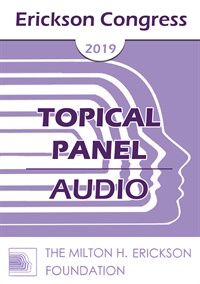
- Average Rating:
- Not yet rated
- Topic Areas:
- Topical Panels | Trauma | Post-Traumatic Stress Disorder (PTSD)
- Categories:
- Erickson Congress | Erickson Congress 2019
- Faculty:
- John Beahrs, MD | Stephen Gilligan, PhD | Camillo Loriedo, MD, PhD | Teresa Robles, MA, PhD
- Duration:
- 58 Minutes
- Format:
- Audio Only
- Original Program Date:
- Dec 14, 2019
- Short Description:
- Posttraumatic stress disorder consists of a complex of symptoms including hyper arousal, social withdrawal and intrusions. The panelists will describe commonalities and differences in their approach to PTSD.
- Price:
- $15.00 - Base Price
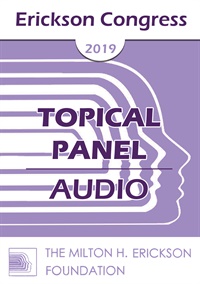
- Average Rating:
- Not yet rated
- Topic Areas:
- Topical Panels | Trauma | Post-Traumatic Stress Disorder (PTSD)
- Categories:
- Erickson Congress | Erickson Congress 2019
- Faculty:
- Ronald Alexander, PhD | Maggie Phillips, PhD | Robert Schwarz, PsyD
- Duration:
- 55 Minutes
- Format:
- Audio Only
- Original Program Date:
- Dec 14, 2019
- Short Description:
- Post-traumatic stress disorder consists of a complex of symptoms including hyper arousal, social withdrawal and intrusions. The panelists will describe commonalities and differences in their approach to PTSD.
- Price:
- $15.00 - Base Price
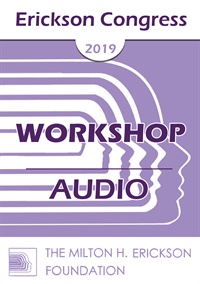
- Average Rating:
- Not yet rated
- Topic Areas:
- Workshops | Post-Traumatic Stress Disorder (PTSD) | Trauma
- Categories:
- Erickson Congress | Erickson Congress 2019
- Faculty:
- John Beahrs, MD | Bill O'Hanlon, MS | Michael Yapko, PhD | Jeffrey Zeig, PhD
- Duration:
- 1 Hour 57 Minutes
- Format:
- Audio Only
- Original Program Date:
- Dec 13, 2019
- Short Description:
- “Traumatophobia” is fear of fear itself, sensitizing people to the psychological effects of stressors such as crime, terror, and hurtful communications. Paradoxically, increasing knowledge of trauma has not empowered, but sensitized us to it — thereby amplifying its effects. The Institute of Medicine challenged society to examine this process, and redirect our knowledge toward building resilience.
- Price:
- $15.00 - Base Price
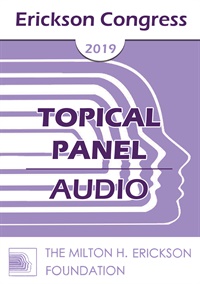
- Average Rating:
- Not yet rated
- Topic Areas:
- Workshops | Ericksonian Hypnosis and Therapy Techniques | Hypnosis | Hypnotherapy | Post-Traumatic Stress Disorder (PTSD)
- Categories:
- Erickson Congress | Erickson Congress 2019
- Faculty:
- Jorge Abia, MD
- Duration:
- 2 Hours
- Format:
- Audio Only
- Original Program Date:
- Dec 13, 2019
- Short Description:
- Immediately after earthquakes in center and southern Mexico in 2017, crisis intervention were done by Mexican navy health care professionals to solve crisis and prevent PTSD. Groups of patients were structured for crisis intervention with Ericksonian hypnotherapy, ranging from 50 to 200 patients. Methodology will be presented along with recorded interviews to two captains head of Mexican navy health care system. One powerful proven group technique will be taught.
- Price:
- $15.00 - Base Price
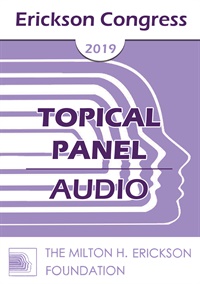
- Average Rating:
- Not yet rated
- Topic Areas:
- Workshops | Hypnosis | Future Oriented | Post-Traumatic Stress Disorder (PTSD) | Resources | Trauma | Hypnotherapy
- Categories:
- Erickson Congress | Erickson Congress 2019
- Faculty:
- Consuelo Casula, Dipl. Psych
- Duration:
- 1 Hour 49 Minutes
- Format:
- Audio Only
- Original Program Date:
- Dec 12, 2019
- Short Description:
- During our entire life - from adolescence to old age- we face transition phases, changes and passages going towards the future. During life passages hypnosis can help to harmonize the process of losses and winnings, change and adaptation, crisis and opportunity. The workshop will show a hypnotherapeutic model based on the identification of the resources of the present with which to revisit the traumas of the past and then turn to the future with hope and resiliency.
- Price:
- $15.00 - Base Price
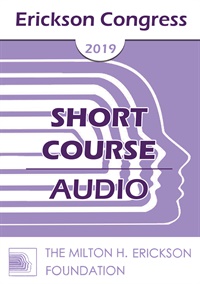
- Average Rating:
- Not yet rated
- Topic Areas:
- Short Courses | Abuse | Post-Traumatic Stress Disorder (PTSD) | Psychology | Psychotherapy | Trauma
- Categories:
- Erickson Congress | Erickson Congress 2019
- Faculty:
- Patrick McCarthy, MBCHB
- Duration:
- 1 Hour 19 Minutes
- Format:
- Audio Only
- Original Program Date:
- Dec 12, 2019
- Short Description:
- This exercise allows people to park all of their problems without any disclosure of their problems. Complete privacy. There is no need to discuss thir problems at all. The micro-structure of the session will be explored to show the various safety devices used. This astonishing exercise can be used for PTSD, abuse, trauma, losing car keys, financial concerns, i.e. absolutely anything! It received a great reception at the ISH meeting in Montreal.
- Price:
- $15.00 - Base Price
Tags: Abuse Psychology Psychotherapy PTSD Trauma
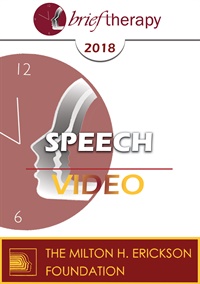
Credit available - Click Here for more information
- Average Rating:
- Not yet rated
- Topic Areas:
- Speeches | Trauma | Brief Therapy | Future Oriented | Post-Traumatic Stress Disorder (PTSD)
- Categories:
- Brief Therapy Conference | Brief Therapy Conference 2018 | Online Continuing Education
- Faculty:
- Bill O'Hanlon, MS
- Course Levels:
- Master Degree or Higher in Health-Related Field
- Duration:
- 57:49
- Format:
- Audio and Video
- Original Program Date:
- Dec 09, 2018
- Short Description:
- People with post-traumatic stress often suffer for years and develop a variety of troubling and often crippling problems. This talk will detail a philosophy and methods of working briefly and effectively with people who have been traumatized. An array of new methods have shown that previous conceptions and methods of working with trauma are unnecessarily long-term and re-traumatizing. These new approaches, rather than being based on the past and deterministic models, are oriented towards the present and future and a sense of possibilities. You will leave equipped with a different understanding of how to treat trauma and four specific methods you can use right away in your work.
- Price:
-
Sale is $29.00
price reduced from Base Price - $59.00
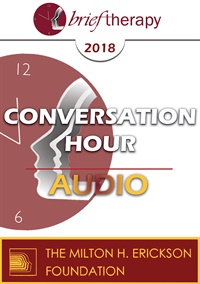
- Average Rating:
- Not yet rated
- Topic Areas:
- Great Conversations | Children and Adolescent Therapy | Family Therapy | Trauma | Brief Therapy | Post-Traumatic Stress Disorder (PTSD)
- Categories:
- Brief Therapy Conference | Brief Therapy Conference 2018
- Faculty:
- Camillo Loriedo, MD, PhD | Lynn Lyons, LICSW
- Duration:
- 1:00:58
- Format:
- Audio Only
- Original Program Date:
- Dec 08, 2018
- Short Description:
- Trauma does not only affect individuals; it effects families. Systemic perspectives on the sequel to trauma will be presented.
- Price:
- $15.00 - Base Price
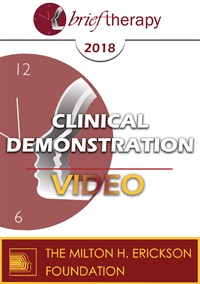
Credit available - Click Here for more information
- Average Rating:
- Not yet rated
- Topic Areas:
- Clinical Demonstrations | Brief Therapy | Trauma | Future Oriented | Post-Traumatic Stress Disorder (PTSD)
- Bundle:
- Learning Track - Turn Down the Trauma
- Categories:
- Brief Therapy Conference | Brief Therapy Conference 2018
- Faculty:
- Bill O'Hanlon, MS
- Course Levels:
- Master Degree or Higher in Health-Related Field
- Duration:
- 1:06:05
- Format:
- Audio and Video
- Original Program Date:
- Dec 08, 2018
- Short Description:
- This live demonstration will illustrate how to briefly connect with a client who has been suffering from some aftereffect from trauma and to help the client resolve some of that post-traumatic suffering.
- Price:
-
Sale is $29.00
price reduced from Base Price - $59.00
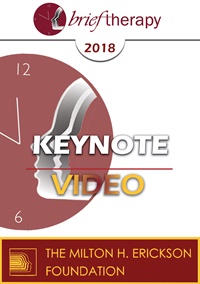
Credit available - Click Here for more information
- Average Rating:
- Not yet rated
- Topic Areas:
- Keynotes | Trauma | Brief Therapy | Meditation, Spirituality and Yoga | Post-Traumatic Stress Disorder (PTSD) | Music
- Bundle:
- Learning Track - Turn Down the Trauma
- Categories:
- Brief Therapy Conference | Brief Therapy Conference 2018 | Online Continuing Education
- Faculty:
- Bessel van der Kolk, MD
- Course Levels:
- Master Degree or Higher in Health-Related Field
- Duration:
- 1:06:32
- Format:
- Audio and Video
- Original Program Date:
- Dec 06, 2018
- Short Description:
- This workshop will show how trauma affects the developing mind and brain, and teach how trauma affects self-awareness and self-regulation. We will focus on the fundamental difference between trauma desensitization vs. integration and growth, and look at the difference between disrupted attachment and traumatic stress. We will examine the role of interpersonal rhythms and attunement in establishing a sense of self and community. This workshop will discuss and demonstrate affect regulation techniques, examine ways to deal with fragmented self-experience, and teach the benefits of yoga, EMDR, meditation, neurofeedback, music and theater.
- Price:
-
Sale is $29.00
price reduced from Base Price - $59.00
Please wait ...

